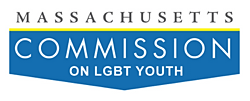 BOSTON, Mass. — The Massachusetts Commission on Lesbian, Gay, Bisexual, and Transgender (LGBT) Youth applauds the release of guidelines last Friday by the Massachusetts Department of Elementary and Secondary Education (DESE) outlining how school communities should support transgender and gender-nonconforming students.
BOSTON, Mass. — The Massachusetts Commission on Lesbian, Gay, Bisexual, and Transgender (LGBT) Youth applauds the release of guidelines last Friday by the Massachusetts Department of Elementary and Secondary Education (DESE) outlining how school communities should support transgender and gender-nonconforming students.
“We commend the Department of Elementary and Secondary Education for the speedy release of guidance that spells out in no uncertain terms the protections assured to transgender and gender-nonconforming students in Massachusetts,” said Julian Cyr, Chair of the Commission. “Under Governor Patrick’s leadership, state agencies continue to close gaps in service delivery and education policy that persist for LGBT youth in the Commonwealth. This guidance is an important step toward leveling the playing field for transgender students.”
In the wake of the 2011 passage of landmark legislation prohibiting discrimination on the basis of gender identity in education, housing, employment, and credit, the Commission issued a recommendation urging DESE to offer practical guidance for schools on how to comply with the new law.
“We are pleased that DESE responded so proactively to our recommendations for supporting transgender and gender-nonconforming students in Massachusetts schools,” Cyr said. “The Commission is committed to continuing to collaborate with DESE as it offers technical assistance and professional development to reduce the health and educational disparities currently faced by transgender and gender-nonconforming students.”
Transgender and gender-nonconforming students face higher rates of bullying in and out of schools compared to their peers. A 2011 survey by the Gay, Lesbian and Straight Education Network (GLSEN) found that 75 percent of transgender students had experienced verbal harassment in the past year and 32 percent experienced physical harassment.
Additionally, students, parents, and school personnel consistently report confusion about how to support transgender and gender-nonconforming students even in school districts seeking to comply with nondiscrimination policies.
As one parent of a gender-nonconforming child noted at the public hearings held by the Commission in June 2012, “What was hard for me, as a mom, was having to go to the schools and be an educator of the educators. There are some parents out there that don’t want to be a teacher and are not able to be a teacher, and I worry about those children.”
The new DESE guidance equips school districts throughout the Commonwealth with an understanding of nondiscrimination regulations and policies on gender identity and provides specific suggestions for creating safe and affirming school communities for transgender and gender-nonconforming students.
In particular, the guidance calls for:
- Proper use of names and pronouns
- Privacy and confidentiality policies for transgender and gender-nonconforming students
- Student participation in sex-segregated classes and athletic activities in a manner consistent with the student’s gender identity
- Appropriate access to restrooms and locker rooms
- Education and training for teachers about transgender students
The Commission on LGBT Youth is established by law as an independent state agency to recommend and advocate to all branches of state government effective policies, programs, and resources for LGBT youth to thrive. Founded in 1992 as the first body of its kind in the nation, the Commission has been advocating for the wellbeing of LGBT youth in schools, families, and communities for the past 20 years.
The Commission issues annual recommendations to help make Massachusetts state agencies aware of and responsive to the needs of LGBT youth populations in the Commonwealth. Recommendations for FY14 are available at: http://tinyurl.com/b8eexcw.







